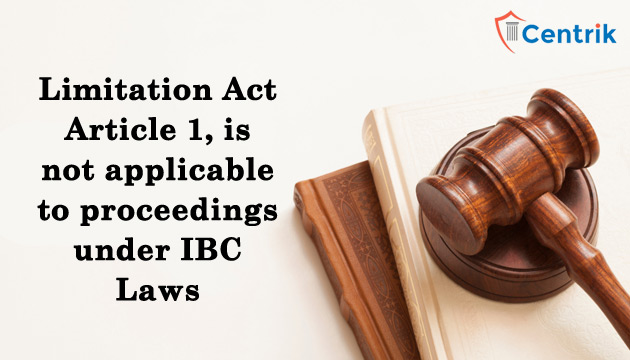
Status as on- 15/06/2022
INTRODUCTION
Article 137 of the Limitation Act provides a limitation period of 3 years from the date when the right to apply accrues and it provides for a limitation period for any application for which no period of application is provided in any of the articles in the Schedule to the Limitation Act. Article 137 is having a wider scope than Article 1 of the Limitation Act and Article 1 is not applicable to the proceedings under the Insolvency and Bankruptcy Code Article 1 is also not applicable to the petition filed by the Operational Creditor under Section 9 of the Insolvency and Bankruptcy Code.
FACTUAL MATRIX
- The current petition is filled by S.M Ghoghai (petitioner) for the initiation of corporate insolvency resolution proceedings against the respondent Schedulers Logistic Private Limited (Respondent).
- Petitioner is engaged in the business of transport services and the corporate debtor is engaged in the business of providing logistic support. The corporate debtor approached the petitioner for the transport services in various parts of India and the Petitioner had also raised invoices from time to time according to the services provided.
- The corporate debtor rendered the service of the petitioner for the transportation of frozen food and accordingly petitioner had raised the invoices and which were also duly acknowledged and received by the corporate debtor.
- Current petition is filled by the operational creditor to recover the default made by the corporate debtor of Rs 76,04,050/- with interest at the rate of 12% from the actual date of realization. The corporate debtor failed to repay the outstanding dues despite several notices from the operational creditor. The bills of invoices were raised by the Operational Creditor from 03.2015 to 10.10.2016. Hence operational creditor filed an application in NCLT Tribunal, Mumbai in the year 24.10.2019 under Section 9 of the Insolvency and Bankruptcy Code for the initiation of CIRP procedure against the Corporate Debtor.
- NCLT dismissed the application on the ground of limitation because the petition is filed on the basis of the invoice which is prior to three years from the date of filing of the application under Section 9 of the Code and the aggrieved party appealed to NCLAT for the remedy.
ISSUES RAISED
- Where the applicant can take the benefit under Article 1 of the Limitation Act, 1963.
DECISION / UPHELD BY NCLAT
NCLAT referred to the judgement of B.K Educational Services Pvt. Ltd. v. Parag Gupta and Babulal Vardharji Gurjar v. Veer Gurjar Aluminium Industries where the Supreme Court held that the period of limitation for filing an application under Section 7 or 9 of the Code is to be decided as per Article 137 of the Limitation Act which is mentioned in Paragraph 42 of the judgement
“It is thus clear that since the Limitation Act is applicable to applications filed under Sections 7 and 9 of the Code from the inception of the Code, Article 137 of the Limitation Act gets attracted. “The right to sue”, therefore, accrues when a default occurs. If the default has occurred over three years prior to the date of filing of the application, the application would be barred under Article 137 of the Limitation Act, save and except in those cases where, in the facts of the case, Section 5 of the Limitation Act may be applied to condone the delay in filing such application.”
In the present case applicant filled the application as per Article 1 of the Limitation Act and Article 1 is in Part-1 of the schedule of the Limitation Act dealing with suits under the “suits relating to accounts” and the said application cannot be considered as the same and court also noticed that the last payment received by the applicant is on 26th September 2016 and the application ( the actual date of filing of application 24th October 2016) should have been filed within 3 years from the last payment and the NCLAT held that Limitation as per Article 137 will begin to run from the date when the right to apply accrues and the Application filed on the basis of 174 invoices and all invoices being prior to much before three years period from the filing of Section 9 Application, and the adjudicating authority has rightly rejected the application and hence the appeal is dismissed.
Conclusion-
Article 137 is having a wider scope than Article 1 of the Limitation Act where Article 1 is dealing with only those suits under the suits “relating to accounts” and Article 137 provides a limitation period for any application for which no period of limitation is provided in any of the article in the schedule to the Limitation act.
Disclaimer: The above article is based on the personal interpretation of the related orders and laws. The readers are expected to take expert opinions before relying upon the article. For information, please contact us.




 join For Updates
join For Updates